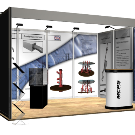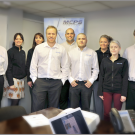- 60,000 contract/tender opportunities per year
- 4 Million UK Companies listed
- 12 million Director Names
- 100 million web pages indexed
MCPS Ltd
Overview
Products
MCPS Ltd specialise in the design and manufacture of Cathodic Protection (CP) and Marine Growth Prevention Systems (MGPS). For over 10 years we have been supplying the marine and offshore industries with equipment designed to protect assets from the damaging effects of corrosion. All of the systems we supply are manufactured according to the strict requirements demanded by these important industry sectors.
Our activities primarily revolve around the production of CP systems consisting of aluminium anodes, zinc anodes and magnesium sacrificial anodes. These are manufactured right here in the UK at either one of our foundries in the south of England or the north of England (where our head office is also based). All of our operations are subject to an ISO 9001:2008 certified quality management system, and all products are manufactured in accordance with industry specifications such as NACE SP0387-2006 and DNV-RP-B401 (full documentation and certification is provided).
You can find out more about our CP and MGPS products in the sections below and on our website. If you require any further advice or assistance, or would like to speak to an expert regarding the use of our systems in marine and offshore environments, please get in touch using the contact details provided above.
MGPS
Our MGPS (Marine Growth Prevention Systems) consist of a copper alloy rod that prevents fouling and an aluminium or ferrous alloy rod which prevents corrosion. Once fitted, an anti-fouling anode requires very little maintenance and has no adverse effects on the marine environment.
Copper alloy anodes are mostly used to prevent marine growth in pipework strainers, heat exchangers, pumps and box coolers, thus removing a common cause of blockages. MCPS can supply them in various sizes.
Aluminium alloy and ferrous alloy anodes, meanwhile, are typically used in conjunction with copper alloyed anodes to prevent corrosion throughout Cu/Ni pipework. These are also available in a variety of sizes.
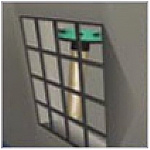
Harbour Anodes
Research has shown that piles used in the construction of jetties and harbours are corroding far more quickly than what is acceptable because of an increase in the presence of sulphur reducing bacteria. This phenomenon has been labelled ‘Accelerated Low Water Corrosion’ (ALWC). ALWC is identified by soft, orange, organic bacteria with a black layer hiding bright, pitted steel. Cathodic Protection (CP) anodes are proven to greatly reduce the corrosion rate in such cases, preserving the life of the pile and mitigating the risk of structural failure, which could potentially cause casualties and inflict a lot of damage on operational equipment and vessels. Find out more about the use of CP anodes by visiting MCPS online.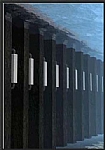
Hull Anodes
All sorts of coatings are applied to the hulls of vessels in order to protect against the onset of corrosion, yet they are often compromised by microscopic pinhole defects or localised damage typically inflicted whilst the vessel is in service. To help preserve the life of coatings (and thus reduce the exposure of steel to corrosion), it is common to use a hull/flush mounted anode. These are made with alloys of zinc, aluminium or magnesium and can be bolted or welded on. Hull anodes are also often used in areas of the hull local to the propellers or actually on the propellers themselves. Find out more about hull anodes and their uses by visiting MCPS online.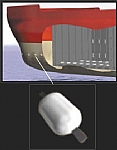
Shaft Earthing
Shafts that are not earthed are known to cause arcing, which in turn can lead to the pitting and stripping of engine bearing surfaces and the creation of hot spots which can result in the ignition of crankcase explosions. By installing shaft earthing equipment as part of the vessel’s Cathodic Protection system, you can prevent static discharges and thus remove the route cause of such damage. If you would like to find out more about our shaft earthing equipment, or would like to discuss your requirements with an expert, please get in touch with MCPS using the contact details provided at the top of this page.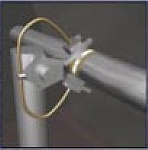
Magnesium Ribbon
Descaling a ship’s ballast tanks requires a lot of manual labour, which can of course be extremely costly. So we recommend the use of a magnesium ribbon instead. It can be easily distributed, it gives an incredibly clean surface, and it avoids the hazards of noise, dust and damage to the structure. Approximately one metre of magnesium ribbon offers enough current density to lift scale from a steel area of around three square metres. When correctly secured in a fully pressed up tank, the ribbon will begin to remove scale within 10-14 days. Find out more about the advantages of using magnesium ribbon for descaling by visiting MCPS online.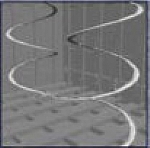
Stand Offshore Anodes
There are a number of reasons why aluminium alloys have become the preferred material for stand off/harbour anodes. The first is that they offer high electromechanical efficiency, enabling them to be operated at different temperature co-efficients. Another reason is that they are lighter and easier to handle than zinc anodes, and therefore easier to fit.
Zinc is of course a well-proven anode material, and its capacity is virtually unaffected by the operating current density. However, the driving voltage tends to diminish with increasing temperature, and it therefore has limited application.
Find out more about aluminium and zinc stand off/harbour anodes by visiting MCPS online.

Bracelet Anodes
We offer various sizes of bracelet anode in both half shell and segmented versions. These have a utilisation factor of 0.80, but where they are used to reduce wave loads on steel jackets they have utilisation factor of 0.90. If used on pipelines, anode spacing should not exceed 200m, and the amount should increase by a factor of two for the first 500m from the platforms and subsea installations. Outside diameters will usually coincide with that of the pipe, but if this is not possible the anode will be manufactured with a taper which allows for movement.
Tank Anodes
As is the case with ship hulls, the integrity of a tank’s coating is often compromised by microscopic pinhole defects or localised damage typically inflicted whilst in service. It is therefore recommended to use a tank anode which will complement the coating at areas of exposed steel in order to prolong the life of the structure. MCPS offers zinc, aluminium and magnesium tank anodes with various fixing arrangements. Find out more by visiting MCPS online.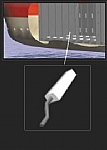
ICCP
Our Impressed Current Cathodic Protection (ICCP) system consists of several anodes, reference electrodes and a transformer/rectifier controller power unit. The type, size and position of these components on the hull is specified according to design parameters that allow not only for the size of the vessel but also for fluctuations in the protection current which are likely to be encountered during sea-going service. More detailed information can be found on the MCPS website.
Engine Anodes
Engine heat exchangers are commonly susceptible to corrosion due to the difference in metal between the casing and the tube stack. However, corrosion can be greatly reduced using a zinc pencil anode. These are designed by MCPS in various sizes to protect a certain distance and surface area. We have zinc anodes for many makes of engine, including Volvo-Penta, BMW, Bukh, Evinrude, OMC, Johnson, Mercruiser-Mercury, Yanmar and Yamaha.
Details
Info
| Registration Number: | n/a |
| VAT Number: | n/a |
| No of Employees: | n/a |
| Annual Turnover: | n/a |
| Importers: | |
| Exporters: | |
| Company Type: |
|
Opening Times
| Monday | 09:00 AM - 05:30 PM |
| Tuesday | 09:00 AM - 05:30 PM |
| Wednesday | 09:00 AM - 05:30 PM |
| Thursday | 09:00 AM - 05:30 PM |
| Friday | 09:00 AM - 05:30 PM |
| Saturday | Closed |
| Sunday | Closed |
Questions
Additional Information
Gallery
- Omex Agrifluids Ltd
- Gho Pressings Ltd
- Display Screens
- Hollow Plastic Planks
- Gosnell Fx Ltd
- SERVICED ACCOMMODATION SOUTH YORKSHIRE LTD
- Microwave Anechoic Chambers
- Mobile Toilets
- Watch Merseyside Ltd
- FAIRBAIRN TRANSPORT LTD
- Historic Le Mans Ltd
- Almad Ltd
- Tph Pubs Ltd
- Trace Heating Cables
- AS9100 Aerospace Quality Management Accreditation Services
- Concrete Finishing Plant & Equipment
- Coolflow Ventilation Ltd
- HARVEY & GREEN CONSTRUCTION Ltd
- LONDON









